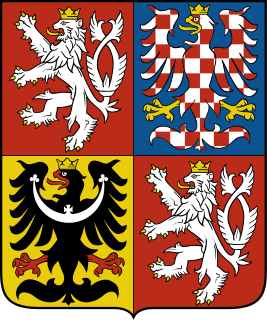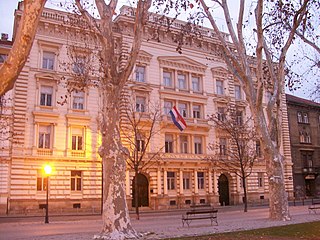Related Research Articles
The politics of Croatia are defined by a parliamentary, representative democratic republic framework, where the Prime Minister of Croatia is the head of government in a multi-party system. Executive power is exercised by the Government and the President of Croatia. Legislative power is vested in the Croatian Parliament. The Judiciary is independent of the executive and the legislature. The parliament adopted the current Constitution of Croatia on 22 December 1990 and decided to declare independence from Yugoslavia on 25 May 1991. The Constitutional Decision on the Sovereignty and Independence of the Republic of Croatia came into effect on 8 October 1991. The constitution has since been amended several times. The first modern parties in the country developed in the middle of the 19th century, and their agenda and appeal changed, reflecting major social changes, such as the breakup of Austria-Hungary, the Kingdom of Serbs, Croats and Slovenes, dictatorship and social upheavals in the kingdom, World War II, the establishment of Communist rule and the breakup of the SFR Yugoslavia.

The Kingdom of Yugoslavia was a state in Southeast and Central Europe that existed from 1918 until 1941. From 1918 to 1929, it was officially called the Kingdom of Serbs, Croats and Slovenes, but the term "Yugoslavia" was its colloquial name due to its origins. The official name of the state was changed to "Kingdom of Yugoslavia" by King Alexander I on 3 October 1929.

The Ustaše, also known by anglicised versions Ustasha or Ustashe, was a Croatian fascist and ultranationalist organization active, as one organization, between 1929 and 1945, formally known as the Ustaša – Croatian Revolutionary Movement. Its members murdered hundreds of thousands of Serbs, Jews, and Roma as well as political dissidents in Yugoslavia during World War II.

The Independent State of Croatia was a World War II-era puppet state of Nazi Germany and Fascist Italy. It was established in parts of occupied Yugoslavia on 10 April 1941, after the invasion by the Axis powers. Its territory consisted of most of modern-day Croatia and Bosnia and Herzegovina, as well as some parts of modern-day Serbia and Slovenia, but also excluded many Croat-populated areas in Dalmatia, Istria, and Međimurje regions.

The Croatian Parliament or the Sabor is the unicameral legislature of the Republic of Croatia. Under the terms of the Croatian Constitution, the Sabor represents the people and is vested with legislative power. The Sabor is composed of 151 members elected to a four-year term on the basis of direct, universal and equal suffrage by secret ballot. Seats are allocated according to the Croatian Parliament electoral districts: 140 members of the parliament are elected in multi-seat constituencies. An additional three seats are reserved for the diaspora and Croats in Bosnia and Herzegovina, while national minorities have eight places reserved in parliament. The Sabor is presided over by a Speaker, who is assisted by at least one deputy speaker.
The Government of Croatia, formally the Government of the Republic of Croatia, commonly abbreviated to Croatian Government, is the main executive branch of government in Croatia. It is led by the president of the Government, informally abbreviated to premier or prime minister. The prime minister is nominated by the president of the Republic from among those candidates who enjoy majority support in the Croatian Parliament; the candidate is then chosen by the Parliament. There are 20 other government members, serving as deputy prime ministers, government ministers or both; they are chosen by the prime minister and confirmed by the Parliament (Sabor). The Government of the Republic of Croatia exercises its executive powers in conformity with the Croatian Constitution and legislation enacted by the Croatian Parliament. The current government is led by Prime Minister Andrej Plenković.

Ljubomir "Ljubo" Miloš was a Croatian public official who was a member of the Ustashe of the Independent State of Croatia (NDH) during World War II. He served as commandant of the Jasenovac concentration camp on several occasions and was responsible for various atrocities committed there during the war. He fled Yugoslavia in May 1945 and sought refuge in Austria. In 1947, he returned to Yugoslavia with the intention of starting an anti-communist uprising. He was soon arrested by Yugoslav authorities and charged with war crimes. Miloš was found guilty on all counts and hanged in August 1948.

The Croatian Football Federation is the governing body of association football in Croatia. It was originally formed in 1912 and is based in the capital city of Zagreb. The organisation is a member of both FIFA and UEFA, and is responsible for overseeing all aspects of the game of football in Croatia. Its current president is Marijan Kustić.

HŠK Građanski, also known as 1. HŠK Građanski or fully Prvi hrvatski građanski športski klub, was a Croatian football club established in Zagreb in 1911 and dissolved in 1945. The club had a huge influence on the development of football in Croatia and Kingdom of Yugoslavia and achieved its greatest success in the period between the two World Wars.

Miroslav Brozović was a Bosnian Croat professional footballer and football manager who played international football for the Yugoslavia national team, as well as the national team fielded by the Independent State of Croatia during World War II. He played as a defender.
Croatia held an independence referendum on 19 May 1991, following the Croatian parliamentary elections of 1990 and the rise of ethnic tensions that led to the breakup of Yugoslavia. With 83 percent turnout, voters approved the referendum, with 93 percent in favor of independence. Subsequently, Croatia declared independence and the dissolution of its association with Yugoslavia on 25 June 1991, but it introduced a three-month moratorium on the decision when urged to do so by the European Community and the Conference on Security and Cooperation in Europe through the Brioni Agreement. The war in Croatia escalated during the moratorium, and on 8 October 1991, the Croatian Parliament severed all remaining ties with Yugoslavia. In 1992, the countries of the European Economic Community granted Croatia diplomatic recognition and Croatia was admitted to the United Nations.

Croatia–Germany relations are foreign relations between Croatia and Germany. The countries established diplomatic relations on 15 January 1992. Croatia has an embassy in Berlin and five consulates general in Düsseldorf, Frankfurt, Hamburg, Munich and Stuttgart. Germany has an embassy in Zagreb and an honorary consulate in Split.

The Security and Intelligence Agency is the Croatian security and intelligence service founded in 2006 upon the passing of the Security and Intelligence System of the Republic of Croatia Act and by combining the former Counterintelligence Agency (POA), and the Intelligence Agency (OA) which both ceased to operate.

Građanski nogometni klub Dinamo Zagreb, commonly referred to as GNK Dinamo Zagreb or simply Dinamo Zagreb, is a Croatian professional football club based in Zagreb. It is said that the club is the successor of 1. HŠK Građanski, which had been founded in 1911, disbanded in 1945, but Dinamo has little to no connections to HSK Gradanski. Dinamo is 2nd most followed club in Croatia after HNK Hajduk Split who was actually founded in 1911. Dinamo play their home matches at Stadion Maksimir. They are the most successful club in Croatian football, having won twenty-two Prva HNL titles, sixteen Croatian Cups, six Croatian Super Cups, and one Inter-Cities Fairs Cup. The club has spent its entire existence in top flight, having been members of the Yugoslav First League from 1946 to 1991, and then the Prva HNL since its foundation in 1993.

Bertold Eisner (1875–1956) was a Croatian Jewish law professor at the University of Zagreb, pioneer of the Croatian Jurisprudence and writer.

Czech law, often referred to as the legal order of the Czech Republic, is the system of legal rules in force in the Czech Republic, and in the international community it is a member of. Czech legal system belongs to the Germanic branch of continental legal culture. Major areas of public and private law are divided into branches, among them civil, criminal, administrative, procedural and labour law, and systematically codified.

The judiciary of Croatia is a branch of the Government of Croatia that interprets and applies the laws of Croatia, to ensure equal justice under law, and to provide a mechanism for dispute resolution. The legal system of Croatia is a civil law system, historically influenced by Austrian, Hungarian and Yugoslav law, but during the accession of Croatia to the European Union, the legal system was almost completely harmonised with European Union law. The Constitution of Croatia provides for an independent judiciary, led by a Supreme Court and a Constitutional Court. The Ministry of Justice handles the administration of courts and judiciary, including paying salaries and constructing new courthouses. It also administers the prison system.

The Constitutional Act on the Rights of National Minorities in the Republic of Croatia is constitutional law which defines rights of national minorities in Croatia. It is one of in total three Constitutional Acts in the Croatian legal system, with the other two being the Constitutional Act on Implementation of the Constitution of Croatia and the Constitutional Act on the Constitutional Court of Croatia. In its current form, the Act entered into force on 23 December 2002. Its earlier version, under the title Constitutional Act on National and Ethnic Communities or Minorities was passed in December 1991 as a precondition of the international community for the recognition of Croatian independence from the Socialist Federal Republic of Yugoslavia. The Act is hierarchically under the Constitution of Croatia and must comply with it, but above ordinary state laws and decisions, and above statutes and decisions of lower levels of government, which all must be in accordance with this law. Additionally, two special laws were created to define rights regarding education in minority languages and specific rights on the usage of minority languages in public life. Additionally, the Constitution of Croatia itself has articles directly relating to the protection of national minorities, and lists traditional minorities in Croatia.

The Croatian Partisans, officially the National Liberation Movement in Croatia, were part of the anti-fascist National Liberational Movement in the Axis-occupied Yugoslavia which was the most effective anti-Nazi resistance movement led by Yugoslav revolutionary communists during the Second World War. NOP was under the leadership of the League of Communists of Yugoslavia (KPJ) and supported by many others, with Croatian Peasant Party members contributing to it significantly. NOP units were able to temporarily or permanently liberate large parts of Croatia from occupying forces. Based on the NOP, the Federal Republic of Croatia, which was referred to by Winston Churchill as "the Croatian miracle" was founded as a constituent of the Democratic Federal Yugoslavia.
References
- ↑ "Opći građanski zakonik | Hrvatska enciklopedija".
- ↑ Croatian legal history in the European context, Dalibor Čepulo, p. 357